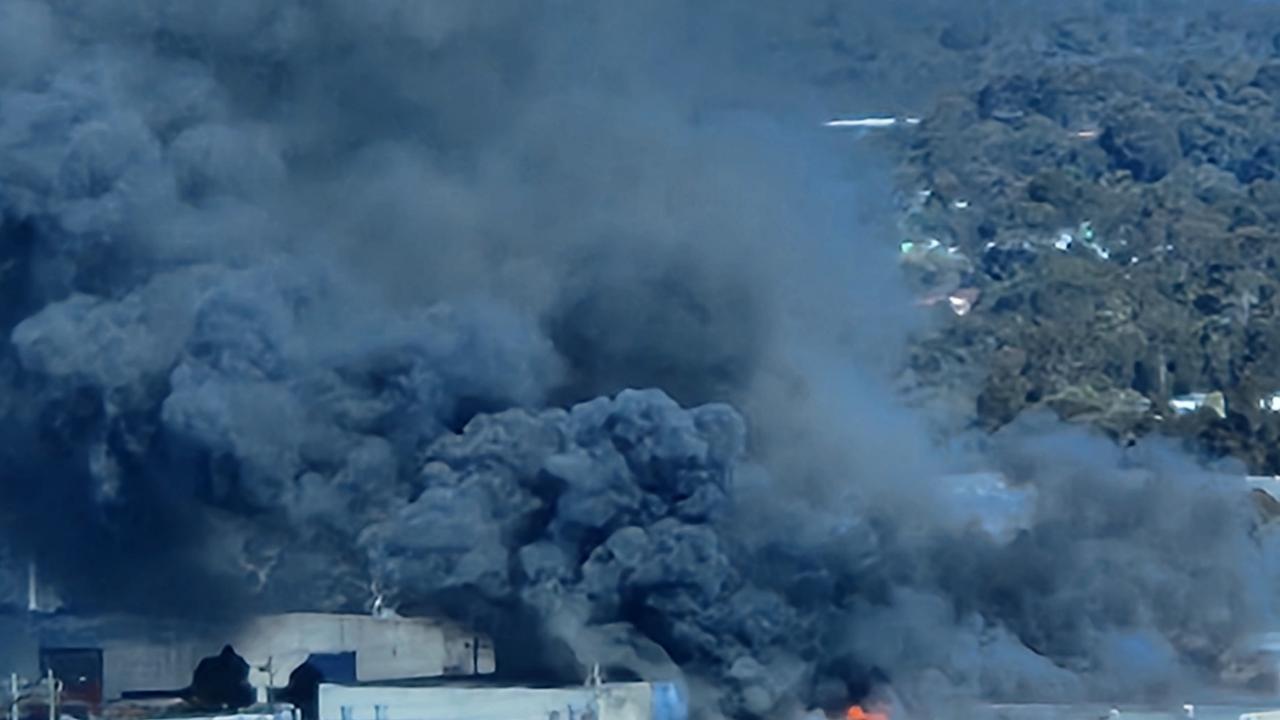Taiwan to vote-in new president, which could have major ramifications for global stability
Taiwan heads to the polls on Saturday to vote-in a new president and the outcome of the election could have major ramifications for the stability of the region and global peace.
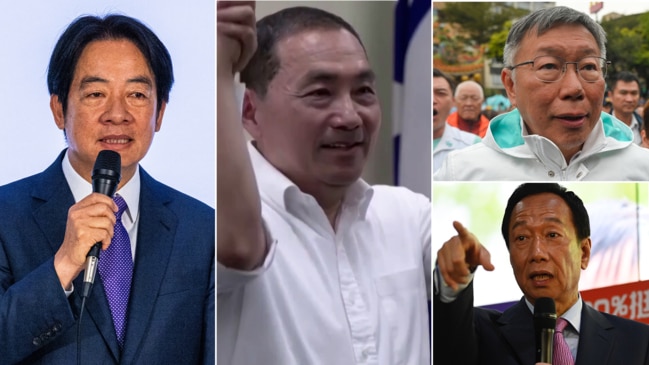
NSW
Don't miss out on the headlines from NSW. Followed categories will be added to My News.
The roar from above jerks the faces of thousands of Taipei residents skyward as a formation of military aircraft screams into view below the low-hanging clouds.
The squadron of six AT-3 Advanced Trainer jets disappear almost as soon as they arrive, leaving behind columns of red, white and blue smoke to the delight of the patriotic crowd below, lined six deep along the wide boulevard outside the city’s Presidential Office.
But this flyover, marking the start of celebrations on Taiwan’s most recent National Day - or “Double Ten Day’’ - is no Beijing-style show of force.
Unlike similar events held by Taiwan’s nearest neighbour, 160km across the Strait, there are no carefully synchronised columns of soldiers or convoys of warfare weaponry.
Instead of missiles, there are marching bands. Instead of bombs, there are bobbleheads — of the giant, football mascot kind — dancing and prancing before the crowd of citizens, government officials and international dignitaries.
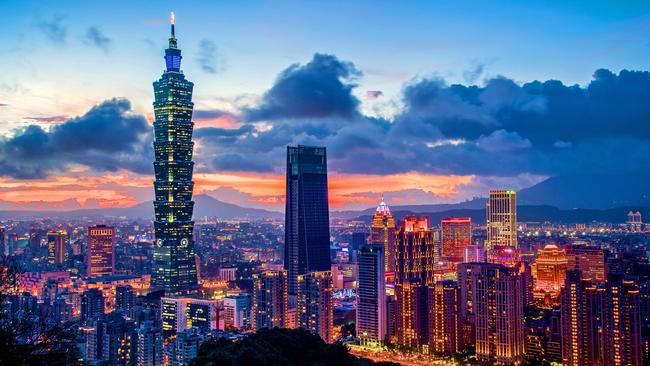
Freedom and fun, not fear and foreboding, seems to be the message here — a display befitting a modern, democratic society that outgoing President Tsai Ing-wen calls a “calm and confident Taiwan’’ in her National Day address to the people.
“I want to thank the people of Taiwan, because we are always able to conquer fear through our solidarity, to resolve hostility through our tolerance, and to overcome challenges through our democracy,’’ President Tsai tells those gathered along the wide street and millions more watching at home.
“We do not provoke, we do not act rashly and we will absolutely not bow to pressure. We have deepened our cooperation with democratic countries around the world as we work together to maintain regional peace and stability , acting as a force for good in the world.’’
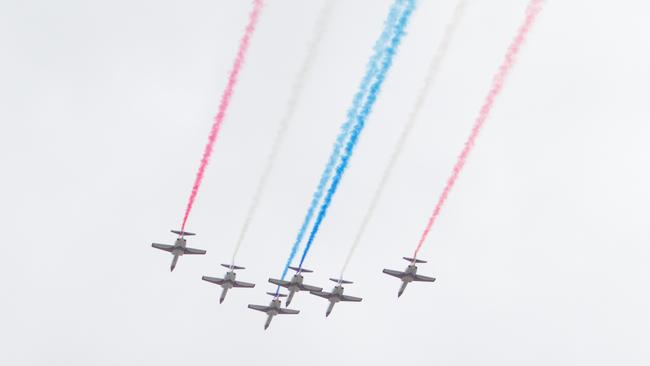
But the lack of military fanfare on this day does by no means suggests the Taiwanese government is not taking its defence seriously — or ignoring the very real threat that sits just off its doorstep, 160km across the Taiwan Strait.
As President Tsai prepares to leave her role after the maximum two-terms in office, tensions between Taiwan and Beijing remain high.
Just last week, Chinese balloons were detected floating high above the median line between the two countries. One of them, at a height of about 10km, continuing flying directly over the west coast Taiwan city of Chiayi. It was the latest in a series of such events that began escalating in December and follows years of provocation by Beijing, which regularly sends its fighter jets and naval vessels into waters and airspace close to Taiwan’s territory.
And the outcome of Saturday’s election could heighten things even further.
China’s President Xi Jinping used his new year address to once again insist that Taiwan’s “reunification” with the “motherland’’ is an “historical inevitability”.
Indeed, the result of the poll could determine whether or not the sabre-rattling in Beijing becomes louder.
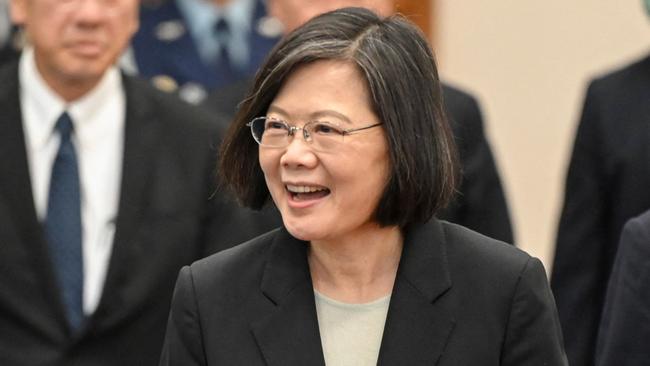
After President Tsai was elected to lead her nation in 2016, China ceased all government communications with Taipei.
Her Democratic Progressive Party is once again the favourite to win the election, with current vice-president Lai Ching-te a poll frontrunner.
A win for Lai and his DPP over the more China-friendly Kuomintang (KMT) and its candidate, former mayor and police chief Hou Yu-ih, would no doubt lead to an even more troubled relationship with Beijing, as Chinese officials have labelled Lai a “troublemaker’’ due to his strong views on Taiwan’s sovereignty.
Government officials from President Tsai down hammer home the desire for the “status quo to be maintained’’ in relation to Taiwan’s democracy and relations with China.
There is no real push for official independence - just the continuation of the current situation which affords the Taiwanese the right to live in a democratic society, free from Beijing’s control.
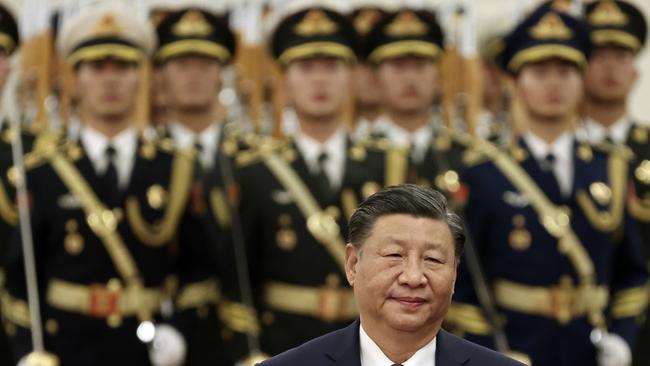
But, they are under no illusions that this system is at risk from the threat China poses.
It is why Taiwan has, in recent years, taken steps to bolster its military defences.
In August, the prototype of Taiwan’s first locally-designed and built submarine was launched. The Narwhal is set to enter service in 2025, after testing is completed.
Taking this leap required immense courage,’’ President Tsai said during her National Day speech.
“But at the end of the day, we did it. We took a big step forward in our national defence self-sufficiency and further enhanced the asymmetric capabilities of our military.
“We once again demonstrated our resolve to defend the Republic of China (Taiwan).
“I believe that the whole world will recognise that Narwhal has taken to the waves to safeguard regional peace and stability.’’
Taiwan’s Foreign Minister Dr Joseph Wu says it is vitally important for Taiwan to continue to
“China has been threatening Taiwan and the threat has been increasing,’’ Dr Wu told The Daily Telegraph.
“They are not only engaged in the military threat against Taiwan, they also engage in hybrid warfare. In other words, they (have) engaged in cyber attacks, engaged in disinformation campaigns and cognitive warfare. Some of their people have even infiltrated Taiwan society, tried to organise political parties or social groups loyal to China.
“And with all this going on, we recognise that China is a threat against Taiwan
“But we also understand if there’s going to be a conflict, the consequences are going to be very serious.These consequences are going to cause economic devastation not just for Taiwan, but also for the rest of the world.’
“But, we also think that it is very important for Taiwan to be able to defend itself.
“A strong military is probably the best deterrence against the Chinese idea of launching a war against Taiwan and hoping that the war is going to end quickly.
“And, in that regard, we have been making more and more investment in our military.’’
But, Dr Wu believes the importance of Taiwan to global trade could be key to ensuring China does not undertake a full-blown invasion, knowing it would almost certainly lead to a wider war.
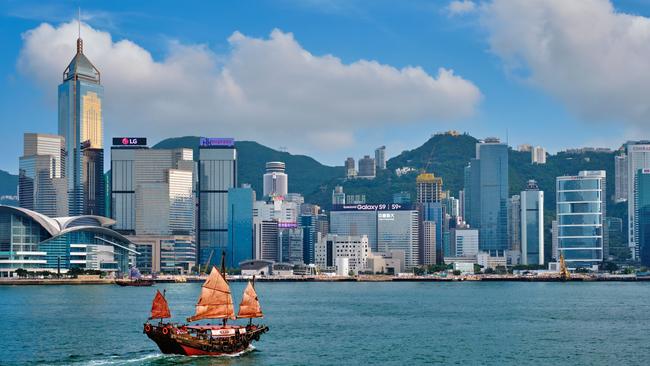
“Here’s a couple of simple facts,’’ he says.
“About 50 per cent of global goods float through the Taiwan Strait, so you can understand that any kind of blockade against Taiwan or any military threat against Taiwan is going to have global consequences.
“90 percent of the highest end semiconductor chips are produced here in Taiwan.So any disruption to the supply chain will have a major impact upon the rest of the world.
“And I think this is gradually being realised by the international community.
“So the United States, Canada, UK, major European countries, Australia, etc, They have started to say the peace and stability of the Taiwan Strait is an integral part of global security and prosperity.’’
As far as the Taiwanese population are concerned, the democratic freedom they have enjoyed for decades now is not something they are willing to give up without a fight.
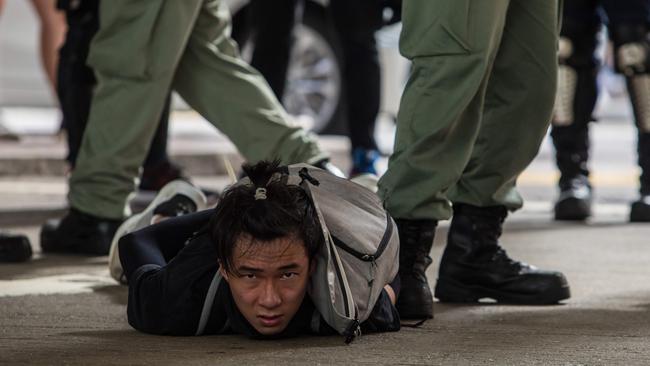
And, having seen the transformation of Hong Kong in recent years, they are not willing to believe that a “one country, two system model’’ would ever allow them the freedom they have enjoyed for so long.
“You see what’s happened in Hong Kong?,’’ Dr Wu asks.
“It’s become part of China and the Chinese authority can exercise anything on Hong Kong these days, like the imposition of the national security law a couple of years ago.
“The freedom is gone. There’s no more democracy in Hong Kong.
“If you ask the regular Taiwanese people whether they would entertain a one country, two system model, more than 90 per cent of the people here say no because it’s the Hong Kong model and the people here in Taiwan don’t want to be ruled by China.
“People here in Taiwan want to live in freedom and enjoy a democratic way of life.’’
Perhaps the final word on Taiwan’s future should go to outgoing President Tsai, a popular leader under whom Taiwan’s minimum wage has risen for eight consecutive years.
“In the midst of tremendous internal and external pressures, Taiwan’s democracy has grown and thrived … and we have emerged with even greater resilience,’’ she says.
“We know that to protect Taiwan’s democracy is to protect the universal value of democracy.
“The Taiwanese people are happy to be people of the world and will be a democratic and free people for generations to come.’’
Originally published as Taiwan to vote-in new president, which could have major ramifications for global stability



